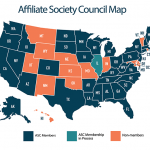On Wednesday, May 16, 2018, the ACR’s Affiliate Society Council (ASC) convened a meeting in Washington, D.C., in conjunction with the ACR’s Advocacy Leadership Conference. Despite inclement weather that delayed or cancelled numerous flights, several rheumatology representatives from states across the U.S. attended the meeting in person, while others participated by conference call.
“It was a little chaotic, at least in terms of getting people there, because of the weather,” says Joseph Cantrell, JD, the ACR’s senior manager of state affairs, but the smaller group size led to some rich outcomes. “It lent itself to more in-depth discussion about the challenges facing state societies and a broader conversation about engaging more rheumatologists in advocacy and getting them [to show] up.”
ASC meetings bring rheumatology providers together from among 42 member states to share lessons learned, work through legislative and regulatory issues at the state level, and brainstorm solutions.
“[The] ACR has the 30,000-foot view of the state level, but a lot of times, state societies have a better feel for the emerging issues we need to be paying attention to,” says Mr. Cantrell.
Issues Discussed
Among the issues discussed at the meeting were biosimilar legislation, non-medical switching, step therapy and copay accumulators.
“When patients get copay assistance cards from pharmaceutical manufacturers to help pay for a drug until they make their annual deductible, some insurers are saying that it doesn’t count toward your deductible,” Mr. Cantrell explains. “Rhode Island had a bill, and we worked in coalition to get that language removed so the copay accumulator won’t be legal.”1
Cody Wasner, a private-practice rheumatologist from Eugene, Ore., was among the providers who attended. He brought with him recent instances in his state of non-medical switching among Medicaid patients with psoriatic arthritis.
Non-medical switching describes a practice in which insurers require patients to use prescription medications that cost the insurer less money, without considering the medical needs of the patient. Sometimes this means insurers move patients off of an effective drug onto another that may not work as well or could adversely affect their health.
Dr. Wasner first learned about it from Mr. Cantrell, who had received a call about it from the National Psoriasis Foundation. The ASC also relies on relationships with other advocacy organizations, patient groups and established coalitions to learn about issues, share information and perspective, and to be most effective.
With a colleague, Dr. Wasner wrote a letter of rebuttal to submit to his state legislature. “If we hadn’t made this connection [with the ASC], we wouldn’t have been able to respond back in a scientific and powerful manner,” Dr. Wasner says. “It takes a whole network to fight against things without getting blindsided.”
More Credibility = More Influence
The ASC also helps lend state rheumatology advocates more credibility, said ASC Chair Christopher Adams, MD, FACP, FACR. He attended the May 16 meeting by phone.
“Based on my experience, [membership in the ASC] helps state societies gain a lot of traction because they can say, ‘Here is our national, expert organization’s policy about this,’” he says. “There’s a credibility that trickles down to the local lawmakers. Our job is to influence policy; our job is not to make policy, but at the same time, if we can help the ones making policy by making their lives a little easier, it’s a win-win situation.”
More Involvement Needed
Manuela Marinescu, MD, a rheumatologist at Rheumatology Associates of Long Island in New York, was forced to participate by phone after her flight was canceled; however, she came away from the meeting with ideas and inspiration, particularly with regard to involving more rheumatologists in advocacy.
“We really need to get more people involved and try to get fellows thinking about it—although they are so busy they don’t have time to learn about all these bills. But in private practice, we are always exposed to this. Even if we don’t want to [get involved], we have to,” Dr. Marinescu says.
She echoed Mr. Cantrell, who said one of the most valuable aspects of the meeting was brainstorming ideas to help inspire more rheumatologists—and in particular recent graduates—to get involved in advocacy work.
“‘Good policy makes good practice’ is one of the things I told the group,” Mr. Cantrell says. “If you don’t have good policy at the state level or the federal level, that can make your practice more difficult, the paperwork can be more of a burden, and often, it makes you less profitable. And with policies like step therapy, it can make your patients suffer more.”
Dr. Marinescu appreciated a suggestion that came out of the ASC meeting to get involved with other specialists in each state, particularly in oncology, gastroenterology, dermatology, “all of whom also use biologics,” she says.
Dr. Wasner applauds the value of cooperative advocacy work, both in his own state, and through the ASC.
“Advocacy is kind of lonely stuff, and people don’t have a lot of time to spend doing it,” says Dr. Wasner. “Having other people to connect to from other states helps multiply the effects that you have, instead of just having your own tiny little perspective. It also gives us some fellowship and motivation.”
Kelly April Tyrrell writes about health, science and health policy. She lives in Madison, Wis.
Reference
- State of Rhode Island General Assembly, Bill 2018 S2532—Relating to insurance, prescription drug benefits, prescription drug marketing. Introduced March 1, 2018.

